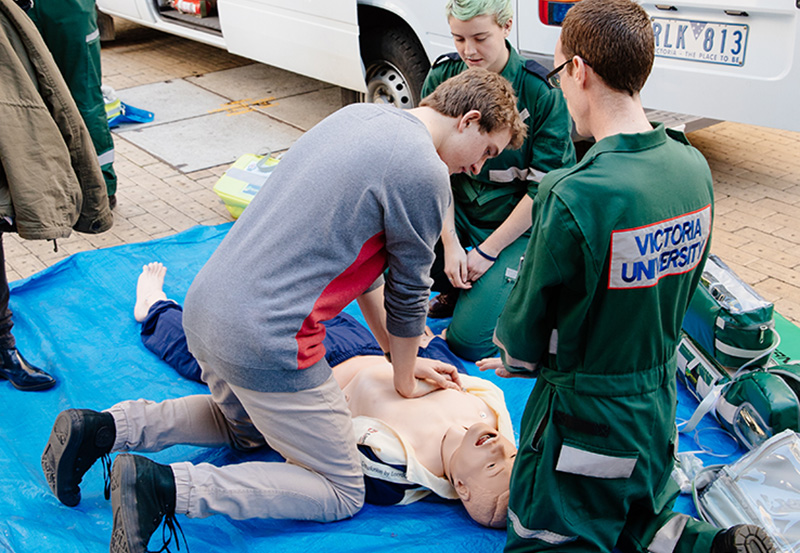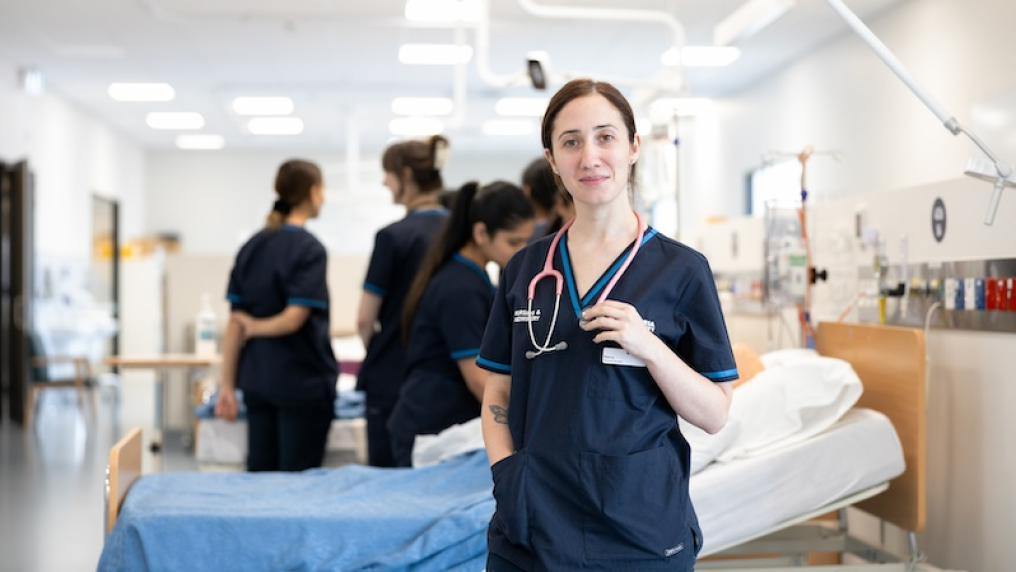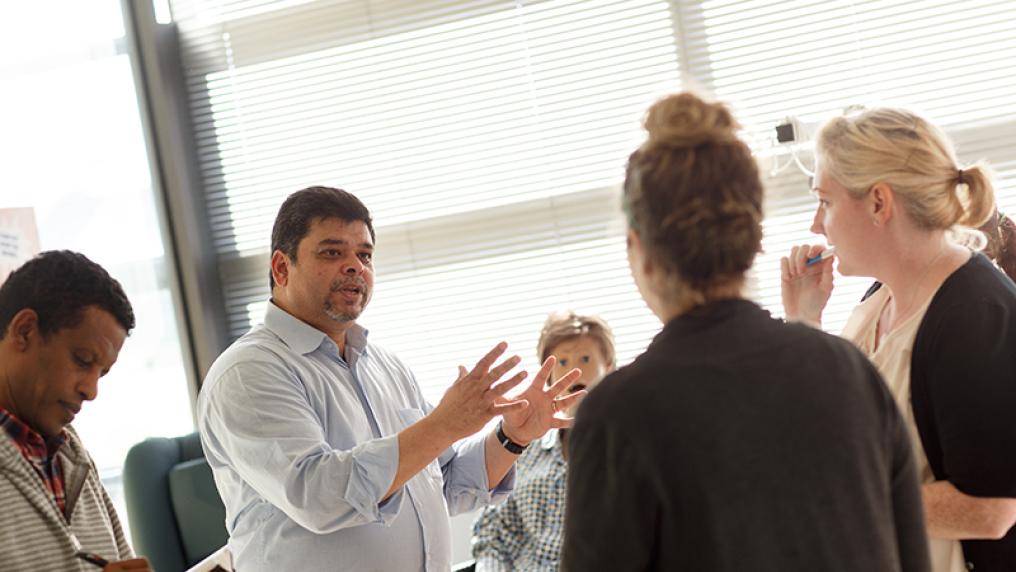Why you should get your first aid certificate
There are many reasons why you may consider completing your first aid training.
Maybe you need a first aid qualification for a particular job. Or perhaps you consider it essential knowledge to add to your collection of life skills.
Keen to attain a first aid certificate in Victoria? At Victoria University (VU) we offer short courses in administering first aid and CPR.
These courses are designed to be completed in a couple of days, giving you skills and knowledge that may one day save a life.
What will I learn as part of my first aid training?
As part of your training, you’ll learn how to recognise:
- cardiac arrest
- burns, poisons, bites and stings, including snake bites
- head, neck and spinal injuries
- wounds and bleeding
- choking and shock.
You'll gain the skills to respond to these medical emergencies, providing assistance and care until a paramedic, EMT or doctor can be sourced,by:
- administering CPR
- using a defibrillator
- bandaging and splinting.

How often do you need to renew a first aid certificate?
While first aid training doesn't 'expire' exactly, you may need to refresh your training so you have knowledge of current best practices, depending on your circumstances.
If you're engaging in first aid training for personal reasons, you aren't required to update your course by any regulations or codes. However, refreshing the course gives you the best possible medical knowledge available at the time.
If you need a first aid certificate as part of your work obligations (particularly if you will act as a designated First Aider), you'll need to follow government guidelines to ensure your business remains compliant with the First Aid in the Workplace Compliance Code.
Generally, first aid training needs to be refreshed every three years. The CPR component of this course should be revisited every 12 months.
It's worth noting that your own industry may have different guidelines that require training at more regular intervals, due to specific risks involved in your type of work.
How long do first aid certificates last in Victoria?
A Statement of Attainment is valid for three years in Victoria.
This means that once you complete your first aid training, you won’t need to refresh your knowledge for another three years.
This only counts for your first aid certificate. If you require a qualification in administrating CPR, you’ll need to attend a refresher course annually.
What are the benefits of learning first aid?
First aid training has many benefits, both for the person expanding their skillset and those around them.
You could save a life
First aid training is a skill for life – in that having that kind of knowledge up your sleeve could save a life.
You’ll know what treatment is best applied before emergency services can arrive on scene. Your knowledge will also help avoid ineffective first aid responses, which can sometimes lead to greater injury or even death.
You can prevent further injuries or stop a crisis from becoming worse
The outcome of some medical emergencies comes down to minutes or even seconds – way before paramedics or EMTs can arrive on the scene.
Having someone on hand who can administer immediate treatment can reduce recovery time and prevent temporary or long-term knock-on effects.
You can help improve safety in the workplace
Not all jobs and industries require first aid training, but this doesn’t mean medical treatment will never be required within your office.
Even ‘white-collar’ jobs come with potential threats. Completing first aid training may increase your awareness of risks, which can be useful in preventing accidents before they happen.
Plus, having multiple people on hand who can correctly administer basic first aid increases the overall safety of a workplace and prevents a bad situation from becoming worse.
You’ll gain confidence & resourcefulness in dealing with emergency situations
There’s a real power and self-assurance that comes from skill-building, and attaining your first aid certificate can bring a positive boost to your own confidence.
If an emergency were to arise, you’ll have the knowledge to step in and provide aid to those in need, until trained professionals are able to arrive on scene.
You may feel compelled to improve your own health
You may find having basic first aid knowledge increases your own standard of living.
Perhaps you’ll feel compelled to keep a small first aid kit in your backpack or carry a snake-bite bandage with you when you go hiking.
Or knowing the risk of cardiac arrest in modern society, you may feel compelled to make incremental changes to your own lifestyle, to avoid such an event from occurring.
First aid courses at VU
At VU, you can gain all the skills you need to achieve a Statement of Attainment by completing the Level II First Aid TNABJ course.
We run this two-day course several times a year at our Footscray Nicholson, St Albans, Sunshine and Werribee campuses. You’ll engage in a mixture of face-to-face and e-learning, as you learn lifesaving skills.
If you need to brush up on your CPR knowledge, you can sign up for our 4-hour CPR (Refresher) TNABG course.
If you’re after a more specialist course, you may choose to complete our Emergency First Aid in Childcare and Education TNABD course. This is specifically designed for people working in the education and care industries.
Which jobs or industries require a first aid certificate or CPR training?
There are some jobs and industries that expect or prefer you to have basic first aid training as a prerequisite. If you’re starting or changing your career path, then it may be worth skilling up as soon as possible.
Paramedics
Emergency responders are required to assess the situation in any kind of medical crisis, to provide immediate action. As part of your training, you’ll learn how to administer first aid treatment, and perform CPR correctly.
Here at VU, we offer a highly respected Bachelor of Paramedicine, which can lead to a fast-paced and rewarding career as a paramedic. You’ll learn from experienced registered health professionals, get on-the-job training and practise your first aid and CPR skills in our clinical simulation suites.
Healthcare professionals
It’s not just paramedics and EMTs who need to know first aid. Many healthcare professionals, such as doctors and nurses, are expected to be able to administer first aid in any situation that calls for it.
Caregivers
Caregiving can be a somewhat unpredictable job role, as those you are supporting tend to be affected by medical conditions or disabilities. First aid knowledge is expected of anyone working in this industry.
Social workers
Social workers often assist people who are at risk of family violence or dealing with mental health issues. It’s of paramount importance that those fulfilling these vital roles know how to respond to a medical emergency.

Fitness trainers & instructors
Gyms, and particularly yoga and Pilates studios, may not seem like high-risk places. Yet accidents can occur at any time when people are engaging in physical activity – they can trip and fall, or suffer health consequences from over-exerting themselves.
All fitness providers must know how to administer first aid in these situations.
We have a range of different courses available for those wanting to train, manage and market fitness centres and gyms, or get involved with community health.
Childcare providers
Any job where you are responsible for the welfare of children requires first aid and CPR training. Kids can be prone to emergency situations, such as choking, cuts and falls. Those entrusted with their care, from educators to nannies, need to know what to do if a medical emergency were to arise.
Explore early childhood education courses at VU. We also offer a two-day Emergency First Aid in Childcare and Education TNABD course, which focuses specifically on first aid treatment for young children.
Construction workers
Construction workers spend their days in high-risk areas, with heavy machinery and threats abounds.
Accidents can happen and it’s important that you and those around you know exactly what to do, should the worst come to pass.
First aid training in the construction industry can help prevent minor injuries from escalating and promote safe practices in a potentially hazardous work environment.
Interested in forging a career in building and construction? We deliver apprenticeships, pre-apprenticeships and other programs.
Electricians
Likewise, electricians are dealing with dangerous materials daily. If an accident were to occur, having someone nearby who has recently completed their first aid certificate could save a life.
Flight attendants
A mile-high emergency is not something anyone wants to deal with. But knowing that flight attendants are trained in first aid and CPR among other emergency responses, brings a little reassurance.


